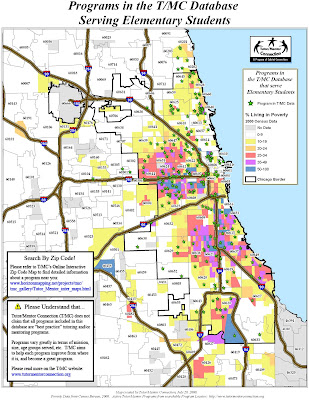Any rate, the reporter, Sandra Guy, was focusing on CVS' "Beauty 360" boutiques. While this has little to do with poverty and tutoring/mentoring, there was one line in there that made me start to think. "CVS expanded its Chicago presence two years ago when it acquired 60 stand-alone Osco drugstores and started building new stores in growing neighborhoods."
Perhaps companies with multiple locations in a city... "mass market retailers such as Walgreens and CVS [who] are trying to position themselves into more of the heath and beauty and wellness areas," would be interested in working to develop the community's wellness in other ways.

(click on the map above to see "full-sized" version)
So I headed to the company website and, sure enough, in the CVS "community" link, the corporate website states that "as our company continues to grow, and touch the lives of more people, we strive to make the biggest and best impact possible in the communities we serve."
They explain that "giving back to our communities is a deeply ingrained value that has defined our culture since the company’s founding in the 1960s. Our Vision to improve the quality of human life inspires us to extend our support and try to make a difference. Our contributions, including grants made through the CVS Caremark Charitable Trust, corporate giving, employee volunteerism and in-kind donations, touch people from all walks of life, and reflect the diversity of the thousands of communities in which our customers, clients and colleagues live and work."
Wow! This is exactly what tutoring and mentoring programs need. And not to single out CVS... they and their charitable spirit just got me to thinking. I bet there are tons of companies with a presence in every corner of the city - with locations in affluent areas as well as impoverished areas. All with an interest in the community.
CVS LOCATIONS, shown with Tutor/Mentor Programs

(click on the map above to see "full-sized" version)
I realize that these mass-market retailers would have difficulty funding tutor/mentor programs near every location, but perhaps a company like CVS could work to develop strategies that help programs in every location get volunteers, donors, and support from other businesses, churches and hospitals.
Perhaps they could sponsor the Tutor/Mentor Connection, creating a "be a volunteer tutor/mentor" link on their web site... or point to links like the T/MC web site which help people learn where, why and how they can be involved.
Some companies may already even be using maps to plan store locations, or to analyze their philanthropy, social marketing, and volunteer involvement strategies. If companies share their strategies on their own web sites, T/MC can point to them as "best practices," and other companies can learn to duplicate good ideas in more places.
This may seem at odds with the competitive nature of business. When Dan Bassill first proposed some of these ideas to me, my first thoughts were, "Companies sharing strategies? Companies "giving money away"? What's in it for them? Why would they do that?"
But think about it. Isn't it possible that, through collaboration and charity, businesses could develop the workforce it needs for the 21st century, instead of having to go out of state and overseas, thus keeping jobs and dollars in the local economy? (Not to mention creating new markets from revitalized neighborhoods, where once impoverished employees now have money to spend.)
As always, please contact the Tutor/Mentor Connection if you'd like to be a sponsor and if you'd like their help developing tutor/mentor strategies for your company.





























